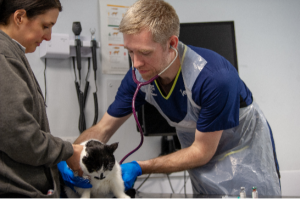Dr. Simon Hagley is an ECC Specialist, Clinical Director Vets Now Manchester Referrals, and Rotating/discipline-specific intern program co-ordinator for Vets Now. Here he gives us a bit more detail on Vets Now Hospital internships.

Why don’t we start by learning a bit more about your background?
I graduated from the University of Bristol in 2011, after which I moved to Brisbane in Australia to undertake a private practice rotating internship. This was where I fell in love with emergency and critical care. They have lots of dangerous things in Australia (snake envenomation, tick paralysis) meaning critical care is well developed. It was fun and exciting, plus the overnight emergency team were very supportive and really sparked and nurtured my interest. I then returned to the UK and spent a couple of years working as an overnight vet in a large emergency hospital before being lucky enough to get an ECC internship at the University of California Davis. I loved it there so much and fortunately they liked me enough to let me stay! I completed my ECC residency in 2019, moved back home and have been working at Vets Now Manchester ever since.
Would you recommend vets do a rotating internship?
Absolutely! Its standard of practice in human medicine when you graduate to undertake two years of internship. I think after studying for five years, everybody can be quite eager to get out there on their own and do the job they’ve worked so hard to be able to do, but I’ve been in clinical practice for a long time now and I wish I could go back to a structured learning environment and be taught again! I think an internship is a nice way to transition into the real world of veterinary medicine. Of course, there are graduate development schemes available, and I’m sure they are great, but there’s a limitation and variation to how much day-to-day support they can provide whereas in our internship, there is always someone there. So yes, I think every vet should do an internship whether newly or less recently graduated – but only if you can be sure it is a supportive program.
And I don’t think an internship is just for people who want to specialise. I think it provides a great foundation for people who want to be excellent general practitioners.
What sort of support do you offer in your program at Vets Now?
I’m incredibly proud of our program and the support that it offers. We’ve worked hard to ensure that our interns do feel supported at all times. They have a line manager for day-to-day/as needed employee discussions, but they are also assigned a pastoral mentor who is usually a referral clinician, someone they can approach who isn’t their line manager who they can just talk to, or seek advice from. But outside of those allocated mentors, I think the best thing about our hospitals is that there’s a great team and culture where everybody supports everybody. It can be a tough job at times, but there is always a friendly face to offer clinical or general advice, or to comfort you if you’re having a hard day. That includes nurses, receptionists, vets and interns. It’s genuinely such a nice and fun place to work.

What about overnight? Do you have to work overnight as an intern?
Yes you do, and I think you’d struggle to find an internship where some component of night work isn’t present. Obviously at Vets Now, we have a big reputation as being an emergency service and our interns rotate through that service on weekends/overnights. I think we’ve got a very fair and healthy rota, and this rotation is separate to our referral rotations, so people aren’t chopping and changing shifts and body clocks. I know that this aspect might be less desirable for people or maybe even daunting, but interestingly these are the rotations that our interns give us the best feedback for – they absolutely love working them. I think they get to put into practice all the things they learnt while rotating through the referral services and they get to actually be their own vet with primary responsibility, which is pretty rare for an internship. But they are never alone, they always have other very experienced emergency clinicians on shift with them and a rockstar set of nurses.
In fact, 5 out of our previous 7 rotating interns at Manchester have stayed on with us as out-of-hours vets which I think is a testament to the work and the culture in our hospital.
What other rotations do the interns get to experience?
They rotate through several referral disciplines, including internal medicine, emergency and critical care, soft tissue surgery, orthopaedic surgery and diagnostic imaging. There is externship time to visit another service or hospital of their choosing. The two hospitals differ slightly in that Glasgow has anaesthetists and an oncologist, but Manchester runs a cardiology service. These aren’t set rotations as we have tried to align the structure between the two sites but that’s why externship time is important to allow our interns to choose what interests them.
Is there anything else people should know about your internship?
We have a fantastic induction period. For the first two weeks we have an orientation to the hospitals, but it goes beyond just getting familiar with the systems and ways of working, we include a tubes, lines and drains practical where the new interns get to use vascular models to place central lines and chest tubes and we also deliver a hands-on wounds and suturing practical. These are alongside a wide array of discussion-based lectures/teaching to make sure everybody is happy with the basics for the types of cases our hospitals see. This is then followed by two weeks of shadowing the outgoing interns, which is really helpful for everybody.
Every week (Wednesday at 5 pm) there is an intern seminar delivered by a referral clinician from either Glasgow or Manchester hospital. These sessions are interactive and cover a wide range of topics that we consider suitable to learn as a rotating Intern. Some of these are practical based CPR sessions others include interns presenting an interesting or difficult case they’ve dealt with.
We also give our interns basic and advanced life support RECOVER online training, VECCS membership for a year, RCVS knowledge library membership to access journals and a CPD budget they can use to cover the cost of travel expenses for their externships or on other CPD courses of their choosing.
What makes your internship better than others?
There are many great internships out there, but I can only vouch for ours. I’m so proud of the program we offer and I know that the quality is excellent. The feedback we get from our intern groups year-on-year is always so rewarding. Of course, we use it to make improvements where necessary but on the whole everybody leaves our intern program, feeling happy and satisfied, and very willing to recommend it to their friends. I can’t really ask for much more than that!
So there you have it! if you’re interested in applying for a rotating internship, please see the details below on how to apply and feel free to email [email protected] or simon.hagley@vets-now.com for more information.
Interested in an internship?
Get in touch
Contact Ryan Powell in the Talent Team on 07816 202690 or email [email protected] to discuss your options.
